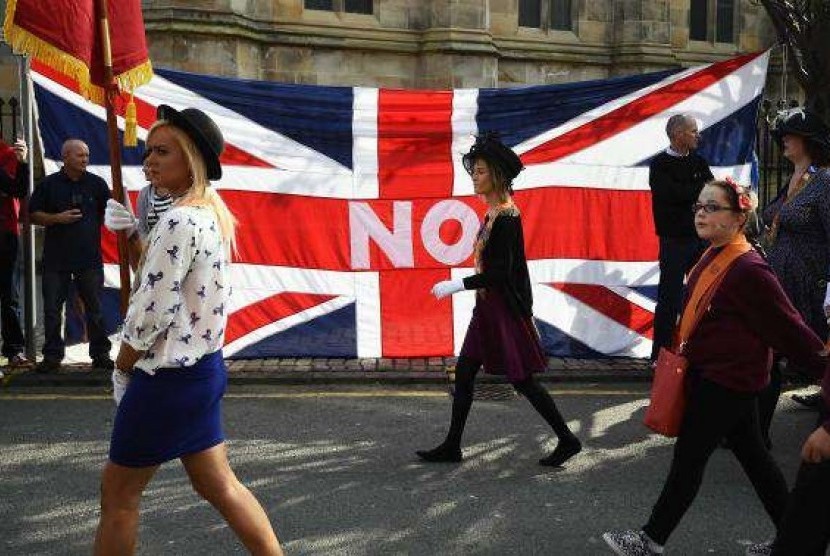REPUBLIKA.CO.ID, EDINBURGH - The fate of the United Kingdom remained unclear five days before a historic referendum on Scottish independence as three new polls on Saturday showed a slight lead for supporters of the union, but one saying the separatist campaign was pulling ahead.
On the final weekend of campaigning, tens of thousands of supporters of both sides took to the streets of the capital Edinburgh and Scotland's largest city, Glasgow. Rival leaders worked across the country to convince undecided voters.
At stake is not just the future of Scotland, but that of the United Kingdom, forged by the union with England 307 years ago. The battle also took a bitter turn on Saturday when a senior nationalist warned businesses such as oil major BP Plc that they could face punishment for voicing concern over the impact of a secession.
The economic future of Scotland has become one the most fiercely debated issues in the final weeks of impassioned debate. Nationalists accuse British Prime Minister David Cameron of coordinating a scare campaign by business leaders aimed at spooking voters, while unionists say separation is fraught with financial and economic uncertainty.
But former Scottish Nationalist Party deputy leader Jim Sillars went much further than separatist leader Alex Salmond, warning that BP's operations in Scotland might face nationalization if Scots voted for secession on Thursday.
"This referendum is about power, and when we get a 'Yes' majority we will use that power for a day of reckoning with BP and the banks," Sillars, a nationalist rival of Salmond's, was quoted by Scottish media as saying.
"BP, in an independent Scotland, will need to learn the meaning of nationalization, in part or in whole, as it has in other countries who have not been as soft as we have been forced to be," Sillars said.
Banks such as Standard Life would face tougher employment laws after a vote for independence, he added. When asked about the comments in a BBC interview, Sillars confirmed he had raised the prospect of nationalization, but said he had used the term to get media coverage. Nationalization was not on the table, he said.
A BP spokesman declined to comment but BP chief Bob Dudley has said that independence could cause "uncertainties," and he did not want to see oil-rich Scotland drift away.
Major banks, oil companies and supermarkets have said that a vote for secession would create concern. North Sea oil would have to be divided up while there is uncertainty over the future currency and central bank of an independent Scotland.
Salmond struck a softer tone on Saturday.
"Mr. Cameron and his Tory friends in Downing Street and the Labour front men in Scotland are going to get their comeuppance next Thursday because Scotland is going to vote yes in very substantial proportions," Salmond said.
"It's unfortunate that a number of businesses have allowed themselves to be recruited by David Cameron and Downing Street, but let me say, after a 'Yes' vote, and we are going to get one, it is incumbent on us to reach out everyone and build that atmosphere of 'Team Scotland'."
Independence supporters say it is time for Scotland to rule itself, free of politicians in London. "No" campaigners say that Scotland is more secure and prosperous as part of the United Kingdom, and the end of the union would destroy three centuries of bonds and shared history, as well as be an economic disaster.


